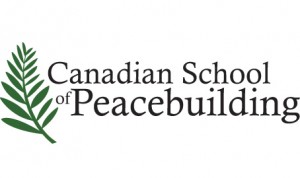Eight renowned peacekeeping instructors highlight peacebuilding program’s sixth year
Canadian School of Peacebuilding (CSOP), an annual summer peace and justice program of Canadian Mennonite University (CMU), hosts eight renowned instructors from around the world as faculty for its 2014 school. Each instructor will teach a 5-day intensive course related to peace, justice, and conflict resolution during one of CSOP’s two sessions.

“This is CSOP’s sixth year and the program’s growing reputation, both locally and globally, has helped us recruit spectacular instructors,” says CSOP Co-Director Valerie Smith. “Similarly, CSOP has attracts participants coming from a wide diversity of cultures, professions and faith backgrounds every year. The positive impact resulting from the learning, collaboration, and interaction of our instructors and students is remarkable and encouraging. All leave the program better equipped with peacebuilding skills that can be used in the workplace, at home or in their communities.”
“We’re always amazed by our students and how the experiences they bring shape the program. They arrive ready to engage with one another. It’s incredible to see the depth of their conversations by the end of a week together,” says CSOP Co-Director Jarem Sawatzky. “Combine these eager learners and contributors with the quality and diversity of the instructors and you have the foundation for life-changing growth and development. CSOP is plugged into an ever-growing network of peacebuilders and that’s exciting.”
CSOP’s first session runs from June 16-20 and features three courses: “Peace Skills Practice,” led by Natasha Mohammed; “Exploring Indigenous Justice and Healing,” by Rupert Ross”; and “Food, Farming and Faith: Living in God’s Creation,” by Norman Wirzba.
Courses in the second session, June 23-27, feature the following: “Restorative Justice with Youth and Schools,” led by Alana Abramson and John R. Weins; “Strategies for Trauma Awareness and Resilience,” led by Elaine Zook Barge; “De-Colonial Theology: Thought and Practice,” by Terry LeBlanc; and “Arts Approaches to Community-Based Peacebuilding,” by Babu Ayindo.
About the Canadian School of Peacebuilding
CSOP aims to educate on peace and justice issues and encourage discussion in a collaborative environment. The goal is for participants to leave these sessions with a new understanding of emerging ideas in peace studies, encouraged to take these practices into their daily living. In addition to the CSOP summer program, courses are available year-round at Canadian Mennonite University’s Shaftesbury and Menno Simons College campuses.
Through its south Winnipeg Shaftesbury campus and its Menno Simons College campus at The University of Winnipeg, Canadian Mennonite University offers one of the most comprehensive undergraduate programs in peace and conflict studies in the world.
Canadian School of Peacebuilding Instructors, June 2014
 Alana Abramson holds a Master’s degree in Criminology from Simon Fraser University and is completing her PhD on the topic of transformational learning and restorative justice. Alana has been an energetic practitioner and educator in the field of restorative justice since 1999. Alana has background with crisis intervention as well as extensive practical experience training to facilitate restorative approaches in prison, school, and community settings. She has been a sessional instructor with Kwantlen Polytechnic University, Douglas College and Simon Fraser University and has worked with various policing agencies to promote more restorative responses for community members including youth and people with disabilities
Alana Abramson holds a Master’s degree in Criminology from Simon Fraser University and is completing her PhD on the topic of transformational learning and restorative justice. Alana has been an energetic practitioner and educator in the field of restorative justice since 1999. Alana has background with crisis intervention as well as extensive practical experience training to facilitate restorative approaches in prison, school, and community settings. She has been a sessional instructor with Kwantlen Polytechnic University, Douglas College and Simon Fraser University and has worked with various policing agencies to promote more restorative responses for community members including youth and people with disabilities
 Babu Ayindo, back by popular demand, currently functions as an independent consultant in the design and facilitation of conflict resolution and peacebuilding initiatives, processes and interventions; as a researcher and trainer in arts, peace education and development communication; and as a program developer and evaluator with various organizations. He has extensive experience in applying “arts approaches” in peacebuilding in various parts of the world since the mid-1980s when he served as artistic director of Chelepe Arts (Nairobi, Kenya) and later as founding artistic director of Amani People’s Theater (Nairobi, Kenya). Babu has taught at peacebuilding institutes around the world. Babu is a Kenyan involved in the design, facilitation and evaluation of conflict transformation and peacebuilding processes for almost two decades in numerous parts of the world. He has also published several articles on arts, peace, and politics, including “Arts Approaches to Peace: Playing Our Way to Transcendence” published in Peacebuilding in Traumatized Societies.
Babu Ayindo, back by popular demand, currently functions as an independent consultant in the design and facilitation of conflict resolution and peacebuilding initiatives, processes and interventions; as a researcher and trainer in arts, peace education and development communication; and as a program developer and evaluator with various organizations. He has extensive experience in applying “arts approaches” in peacebuilding in various parts of the world since the mid-1980s when he served as artistic director of Chelepe Arts (Nairobi, Kenya) and later as founding artistic director of Amani People’s Theater (Nairobi, Kenya). Babu has taught at peacebuilding institutes around the world. Babu is a Kenyan involved in the design, facilitation and evaluation of conflict transformation and peacebuilding processes for almost two decades in numerous parts of the world. He has also published several articles on arts, peace, and politics, including “Arts Approaches to Peace: Playing Our Way to Transcendence” published in Peacebuilding in Traumatized Societies.
 Elaine Zook Barge is the Director of STAR: Strategies for Trauma Awareness and Resilience, an integrated training program of the Center for Justice and Peacebuilding. During the 1980s and 1990s she worked in El Salvador, Nicaragua and Guatemala with Mennonite Central Committee. In her work with communities in conflict zones, Elaine experienced firsthand violence, conflict, poverty, and resilience. She facilitates STAR trainings at Eastern Mennonite University, throughout the US, and in Africa, Asia, the Caribbean and Latin America. She holds an MA in conflict transformation from Eastern Mennonite University’s Center for Justice and Peacebuilding and a Bachelor of Science in nutrition/community development from Eastern Mennonite University.
Elaine Zook Barge is the Director of STAR: Strategies for Trauma Awareness and Resilience, an integrated training program of the Center for Justice and Peacebuilding. During the 1980s and 1990s she worked in El Salvador, Nicaragua and Guatemala with Mennonite Central Committee. In her work with communities in conflict zones, Elaine experienced firsthand violence, conflict, poverty, and resilience. She facilitates STAR trainings at Eastern Mennonite University, throughout the US, and in Africa, Asia, the Caribbean and Latin America. She holds an MA in conflict transformation from Eastern Mennonite University’s Center for Justice and Peacebuilding and a Bachelor of Science in nutrition/community development from Eastern Mennonite University.
 Terry LeBlanc is Mi’kmaq / Acadian, resides in Alberta, and is in his 41st year of marriage to Bev. He is the father of Jennifer, Jeanine, and Matt. He is the founding Chair and Director of the North American Institute for Indigenous Theological Studies (NAIITS). Terry also teaches at George Fox University and Evangelical Seminary, and Tyndale University College and Seminary. Author of various works, Terry has won several awards for his writing. In June 2010, for his part in the creation of NAIITS, Terry became the 28th recipient of the Dr. E.H. Johnson Memorial Award for Innovation in Mission.
Terry LeBlanc is Mi’kmaq / Acadian, resides in Alberta, and is in his 41st year of marriage to Bev. He is the father of Jennifer, Jeanine, and Matt. He is the founding Chair and Director of the North American Institute for Indigenous Theological Studies (NAIITS). Terry also teaches at George Fox University and Evangelical Seminary, and Tyndale University College and Seminary. Author of various works, Terry has won several awards for his writing. In June 2010, for his part in the creation of NAIITS, Terry became the 28th recipient of the Dr. E.H. Johnson Memorial Award for Innovation in Mission.
 Natasha Mohammed has a background in International Peace and Conflict Resolution Studies. In addition to serving as a community counsellor, mediator, group facilitator and Victim Impact Worker, Natasha has taught conflict resolution skills and theory in government, community and university contexts for the past 18 years. She has also worked with participatory processes to create various learning programs, including diversity and youth violence prevention-based curricula.
Natasha Mohammed has a background in International Peace and Conflict Resolution Studies. In addition to serving as a community counsellor, mediator, group facilitator and Victim Impact Worker, Natasha has taught conflict resolution skills and theory in government, community and university contexts for the past 18 years. She has also worked with participatory processes to create various learning programs, including diversity and youth violence prevention-based curricula.
Natasha has a special interest in conflict and culture. She is a founding member of Winnipeg Mosaic, a collective of local peacemakers who foster understanding of the role of religion and culture in life and conflict. Through her work in the federal Multiculturalism Program she is able to support the voices of both mainstream and marginalized communities in ways that ultimately facilitate their development and inclusion into Canadian society. For Natasha relationship is the key to peace in the world, your community, your family and yourself.
 Rupert Ross, as Assistant Crown Attorney for the District of Kenora for more than 20 years, was responsible for criminal prosecutions on over 20 remote Ojibway and Cree First Nations. Between 1992 and 1995, he was seconded to the federal Aboriginal Justice Directorate where he travelled across Canada examining Aboriginal approaches to justice with special emphasis on healing programs for victims, offenders, families, and communities.He wrote two national best-selling books about his journey which radically reshaped the field of restorative justice: Dancing with a Ghost and Return to the Teachings: Exploring Aboriginal Justice. Prior to becoming a lawyer, Rupert worked as a fishing guide in northwestern Ontario, an assistant film editor in Ottawa, a road manager for a Toronto rock band, a bartender in Spain, and a ski instructor in Minaki, Ontario.
Rupert Ross, as Assistant Crown Attorney for the District of Kenora for more than 20 years, was responsible for criminal prosecutions on over 20 remote Ojibway and Cree First Nations. Between 1992 and 1995, he was seconded to the federal Aboriginal Justice Directorate where he travelled across Canada examining Aboriginal approaches to justice with special emphasis on healing programs for victims, offenders, families, and communities.He wrote two national best-selling books about his journey which radically reshaped the field of restorative justice: Dancing with a Ghost and Return to the Teachings: Exploring Aboriginal Justice. Prior to becoming a lawyer, Rupert worked as a fishing guide in northwestern Ontario, an assistant film editor in Ottawa, a road manager for a Toronto rock band, a bartender in Spain, and a ski instructor in Minaki, Ontario.
 John R. Wiens recently retired as Dean of Education at the University of Manitoba. He has strong links to the education community not only in Manitoba, but across Canada. He has worked as a teacher, counsellor, work education coordinator, principal, school superintendent and university lecturer. John is an active educational leader and has served as president of the Manitoba Teacher’s Society, the Canadian Education Association, the Manitoba Research Council, and the Manitoba Educators for Social Responsibility. He also spent a number of years as the chair of the Universities’ Grants Commission and as the director of the Canadian Teachers’ Federation, the Board of Teacher Education and Certification, and the Manitoba Association of School Superintendents. A few of John’s awards and achievements include: the John M. Brown Award for contributions to teacher education (1998), an honourary doctorate from Brandon University (2000), life memberships in the Manitoba Teachers’ Society, the Manitoba Association of School Superintendents, and the Canadian Education Association (2002), and the Manitoba Association of School Trustees President’s Council Award (2007). He was also awarded the Queen’s Golden Jubilee Commemorative Medal (2002) for service in education.
John R. Wiens recently retired as Dean of Education at the University of Manitoba. He has strong links to the education community not only in Manitoba, but across Canada. He has worked as a teacher, counsellor, work education coordinator, principal, school superintendent and university lecturer. John is an active educational leader and has served as president of the Manitoba Teacher’s Society, the Canadian Education Association, the Manitoba Research Council, and the Manitoba Educators for Social Responsibility. He also spent a number of years as the chair of the Universities’ Grants Commission and as the director of the Canadian Teachers’ Federation, the Board of Teacher Education and Certification, and the Manitoba Association of School Superintendents. A few of John’s awards and achievements include: the John M. Brown Award for contributions to teacher education (1998), an honourary doctorate from Brandon University (2000), life memberships in the Manitoba Teachers’ Society, the Manitoba Association of School Superintendents, and the Canadian Education Association (2002), and the Manitoba Association of School Trustees President’s Council Award (2007). He was also awarded the Queen’s Golden Jubilee Commemorative Medal (2002) for service in education.
 Norman Wirzba is Professor of Theology and Ecology at Duke Divinity School and Research Professor in Duke’s Nicholas School of the Environment. His academic training is in philosophy and theology combined with his background in farming in southern Alberta has led him to research in agrarian studies and ecology. He teaches and writes at the intersection of these disciplines, and has published numerous books including The Paradise of God: Renewing Religion in an Ecological Age, Living the Sabbath, Food and Faith: A Theology of Eating, and Making Peace with the Land.
Norman Wirzba is Professor of Theology and Ecology at Duke Divinity School and Research Professor in Duke’s Nicholas School of the Environment. His academic training is in philosophy and theology combined with his background in farming in southern Alberta has led him to research in agrarian studies and ecology. He teaches and writes at the intersection of these disciplines, and has published numerous books including The Paradise of God: Renewing Religion in an Ecological Age, Living the Sabbath, Food and Faith: A Theology of Eating, and Making Peace with the Land.
 The 22-year-old Winnipegger enrolled in the course “Women and Peacebuilding” at the 2012 CSOP as part of a B.A. program in Conflict Resolution Studies at Menno Simons College.
The 22-year-old Winnipegger enrolled in the course “Women and Peacebuilding” at the 2012 CSOP as part of a B.A. program in Conflict Resolution Studies at Menno Simons College.
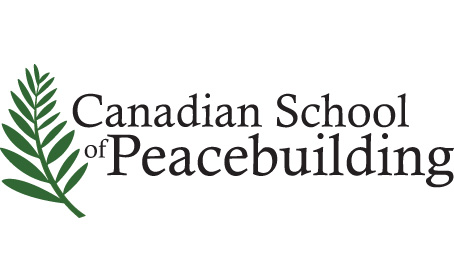









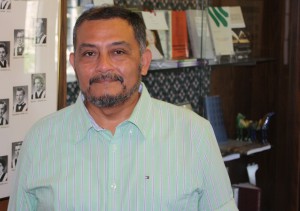
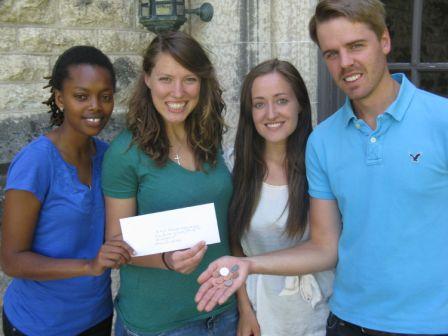
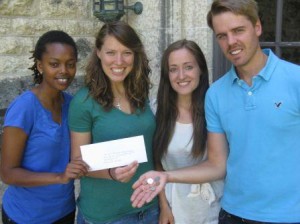 June 30, 2012 – A week ago, a small group of students from Canadian Mennonite University (CMU) and CMU’s Menno Simons College launched a campaign to challenge the federal government’s decision to begin denying supplemental healthcare coverage to refugees on June 30, 2012.
June 30, 2012 – A week ago, a small group of students from Canadian Mennonite University (CMU) and CMU’s Menno Simons College launched a campaign to challenge the federal government’s decision to begin denying supplemental healthcare coverage to refugees on June 30, 2012.

